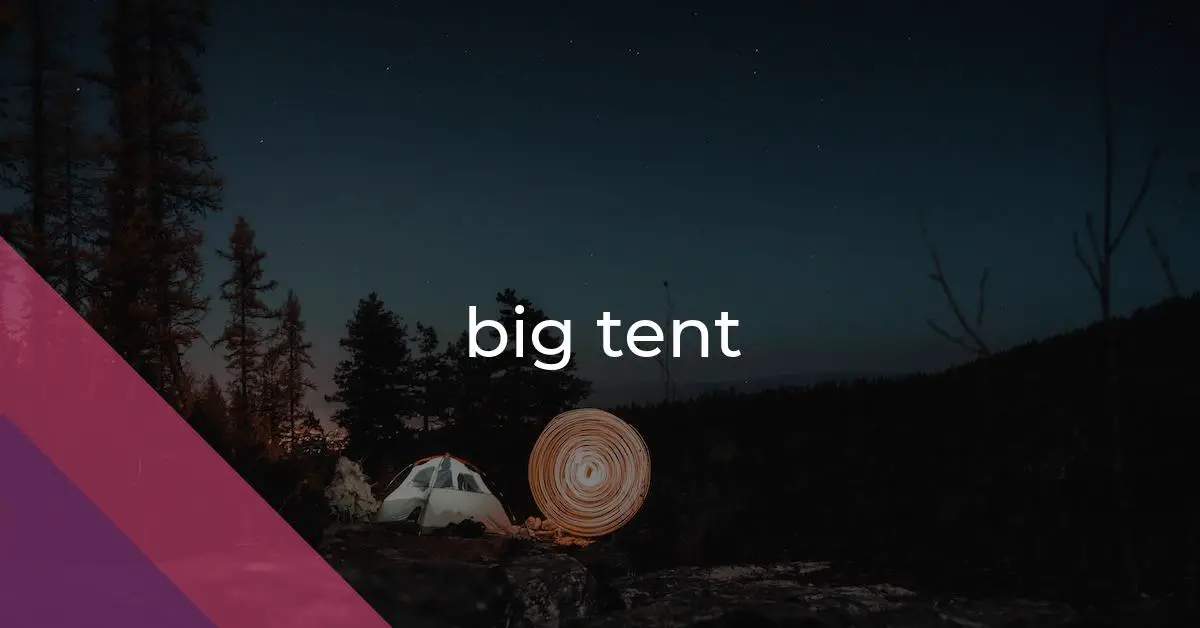big tent: Idiom Meaning and Origin
What does ‘big tent’ mean?
The idiom "big tent" refers to a flexible and inclusive stance or approach, often within a political or ideological context, where various perspectives and beliefs are welcomed and accommodated.

Idiom Explorer
"Large and in charge" is an idiom that means someone is in a position of power or authority, and they are confident and capable of handling their responsibilities.
The idiom "it takes all kinds to make a world" means that the world is diverse and made up of people with different characteristics, opinions, and behaviors.
The idiom "in the tank" means being strongly biased or supportive of someone or something, often to the point of being blindly loyal or uncritical.
The idiom "in a big way" means to do something on a large scale, with great intensity or significance.
The idiom "grand scheme" refers to the overall plan or strategy that encompasses all the smaller details and actions. It emphasizes the larger perspective and long-term goals rather than focusing on individual parts or immediate results.
This idiom means to adapt to a situation or circumstance without resisting or trying to control it. It implies going along with whatever is happening and not trying to change or fight against it.
This idiom means to change one's opinion or support in order to align with the majority, often due to perceived benefits or social pressure.
The idiom "fold one's tent" means to leave or withdraw from a situation or place, especially in a quiet or discreet manner.
The idiom "common ground" refers to a shared belief or interest that allows people to find agreement or understanding despite their differences.
The idiom "camp out" means to stay overnight in a temporary shelter or outdoors, often for recreational purposes or as an alternative to traditional accommodation.
Inclusive Gathering
The idiom "big tent" refers to an inclusive or broad-minded approach that encompasses a wide range of opinions, ideologies, or groups. It is often used in a political context to describe a party or movement that seeks to attract and accommodate diverse perspectives. The origins of this idiom can be traced back to the mid-20th century, where it gained prominence in American politics.
The concept of a big tent can be seen as an extension of the metaphorical idea of a tent that can shelter a large number of people. In its literal sense, a tent is a portable shelter made of cloth, supported by poles and ropes. It provides temporary protection and shelter from the elements. Similarly, a big tent creates a figurative space where people with different beliefs, backgrounds, and interests can find common ground and coexist.
The phrase "big tent" is often used to describe political parties that aim to appeal to a wide range of voters by embracing a diverse set of ideologies. By adopting a big tent approach, parties can attract a broader base of supporters and potentially gain electoral advantage. This strategy allows parties to avoid alienating any particular group and promotes an image of inclusivity.
The origins of the idiom can be traced back to the Republican Party in the United States. In the mid-20th century, the Republican Party underwent a significant ideological transformation, shifting from a relatively homogeneous conservative coalition to a more diverse and inclusive party. The phrase "big tent" emerged as a way to describe this shift in the party's approach.
The idiom gained further popularity in the 1980s and 1990s when political commentators and analysts began using it to analyze party strategies and electoral dynamics. It became a common phrase in discussions about political coalitions and the pursuit of a broad base of support.
One related idiom to "big tent" is the "big picture." This idiom refers to considering the overall or long-term perspective, rather than focusing on specific details. When it comes to the big tent approach, considering the big picture means understanding the importance of accommodating diverse perspectives and ideologies for the sake of the party's overall success. It means recognizing that unity and inclusivity are key to appealing to a wide range of voters and winning elections.
Another related idiom to "big tent" is "anything goes." This idiom suggests a philosophy or approach that is open to accepting a wide range of ideas, behaviors, or practices. In the context of the big tent approach, "anything goes" means being willing to embrace different ideologies and viewpoints, even if they may seem unconventional or at odds with traditional party values. It means creating a space where all perspectives are welcome and respected.
The big tent approach has its advantages and disadvantages. On the one hand, it allows for a broader range of ideas and perspectives to be heard and incorporated into a party's platform. It can also foster unity and cooperation among diverse groups. On the other hand, maintaining a big tent can be challenging, as it requires navigating conflicting interests and balancing the needs of different factions within the party.
Despite the challenges, the big tent approach remains relevant in discussing political coalitions and the pursuit of a broad base of support. It recognizes the value of inclusivity and the importance of accommodating diverse perspectives in order to attract a wider range of voters. By embracing the big picture and being open to "anything goes," political parties can create a space where everyone feels heard and represented. This approach can lead to greater unity and electoral success in an increasingly diverse and complex political landscape.
Example usage
Examples of how the idiom "big tent" can be used in a sentence:
1. Despite their differences in opinion, the political party promoted the idea of a big tent, welcoming members with a wide range of views.
2. The organization aims to be a big tent for artists of all backgrounds, providing a platform for diverse voices to be heard.
3. The conference organizers encouraged a big tent approach, inviting speakers from various industries to ensure a broad perspective on the topic.
More "Metaphor" idioms



